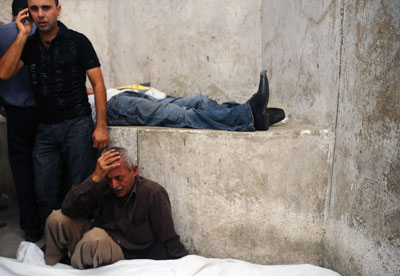New York, October 12, 2011 — A demonstration Sunday against religious persecution by Coptic Christians and their supporters turned into fatal confrontations between the military and civilians that left dozens dead, including a journalist. The Committee to Protect Journalists condemns raids on two television studios and the cutting of electricity, telephone, and Internet service to a leading independent newspaper that occurred at the same time. CPJ is also alarmed by what appears to constitute incitement to violence on Egypt’s state-owned television during the same period.
Wael Mikhael, a cameraman for the Coptic television broadcaster Al-Tareeq, was shot in the head as he filmed the clashes between the military and protesters in front of the headquarters of the Television and Radio Union, commonly referred to as Maspero, the station reported on its website. In all, the clashes resulted in at least 25 deaths and hundreds of injuries, local and international news outlets reported.
“We are appalled that the authorities in Egypt, instead of seriously investigating the circumstances that led to this national tragedy and the senseless death of cameraman Wael Mikhael, have instead chosen to use violence and intimidation to censor coverage of the news,” said Mohamed Abdel Dayem, CPJ’s Middle East and North Africa program coordinator.
Security forces raided the offices of 25TV, a news station established after Mubarak’s ouster in February. The channel, which is housed in a building adjacent to Maspero, reported that security forces stormed their office at 7 p.m., smashing doors and windows, searching the channel’s staff, and forcing the station to go off the air. Footage from the raid indicates that the incident was forceful and traumatizing to staffers. Many journalists said the raid appeared intended to confiscate tape, already aired, showing military personnel running over protesters with carriers and shooting into the crowd. Footage of the personnel carriers has since spread on the Internet.
Security forces also stormed the offices of the U.S. government-funded Al-Hurra, housed in the same building as 25TV, the channel reported. Footage from the raid, which occurred during a live studio broadcast, shows a tense presenter who remained on the air as he tried to calm the soldiers who stormed the office, brandishing automatic weapons as they searched the studio, harassed staff, and disrupted the broadcast.
Shortly after releasing video footage on its website of dozens of dead and injured protesters lying on the ground, the independent daily Al-Shorouk had its electricity, phone lines, and Internet connections severed on two occasions Sunday night, in an apparent attempt to contain the footage, the paper posted on its Twitter account.
Egyptian state television’s coverage of the clashes, which were taking place at its doorstep, was inflammatory throughout, CPJ’s review of footage concludes. During the live broadcast, anchors made claims that turned out to be false — including that soldiers had been killed by protesters — while failing to take note of civilian fatalities. At one point, a presenter called on viewers to go to the scene to “defend” the military from “angry Christian protesters,” the semi-official Ahram Online reported. Egyptian journalists and commentators have roundly condemned state television’s coverage.
On Tuesday, Egypt’s minister of information, Osama Haikal, defended state television’s coverage, adding that he had formed an independent committee to closely examine state television’s footage from the relevant period, local media reported.
“State television’s reporting on Sunday’s events was inflammatory, and authorities must ensure a credible, thorough, and transparent investigation into the coverage,” CPJ’s Abdel Dayem said. “While we recognize that journalists present news and opinion from a wide range of perspectives, to call on viewers to take violent action clearly crosses a line.”
The raids and the provocative coverage on state television come on the heels of an October 4 official “warning” from authorities to two independent satellite stations. The General Authority for Free Zones and Investment (GAFI) accused ONTV of airing programming inconsistent with the type of license the station obtained. GAFI charged Dream TV, a second broadcaster, with violating the “media code of ethics” for a show during which a presenter allegedly expressed personal views. Both stations are widely watched in Egypt and are known for their political programming, which frequently carries critical commentaries of the ruling military council.
